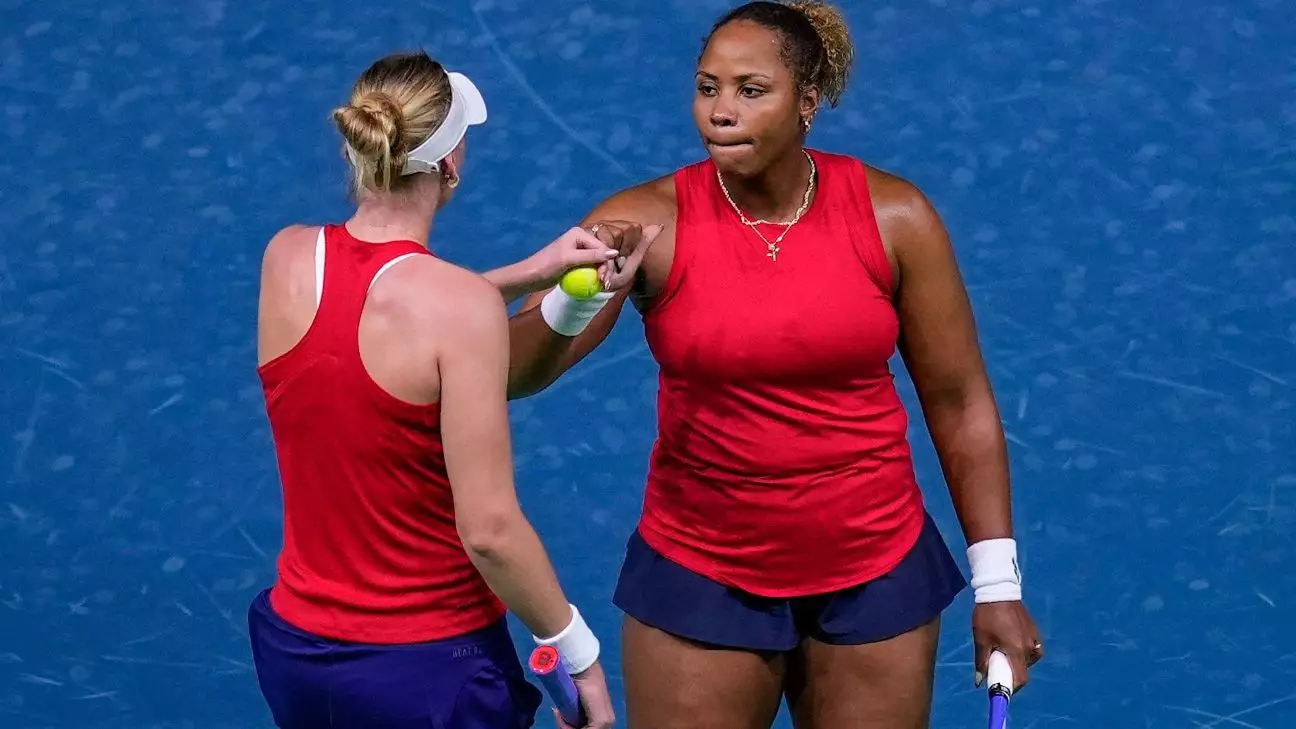In the hallowed arena of the Billie Jean King Cup Finals, held in Malaga, Spain, the stakes were no less than the pride of nations and the thrill of competition. The United States women’s team found themselves on a precipice as they faced Slovakia in the first round of this prestigious tournament. Despite their unyielding spirit, Ashlyn Krueger and Taylor Townsend faced a devastating defeat in the decisive doubles match, losing 6-3, 3-6, 10-8. The drama unfolded into the early hours, with the match concluding just before 1 a.m. local time, highlighting the intense fervor that these tournaments evoke.
Krueger and Townsend’s match was a glaring reminder of the unpredictable nature of tennis. After struggling to find their rhythm, they faced a seemingly insurmountable deficit, trailing 2-9 in the third set against Slovakian duo Tereza Mihalikova and Viktoria Hruncakova. However, in a remarkable display of tenacity, they managed to claw back to 8-10 before the match slipped away from them, culminating in a heartbreaking loss that sealed their fate in the tournament.
Earlier in the day, the U.S. found motivation in the form of Taylor Townsend, who claimed the first point by defeating 17-year-old Renata Jamrichova with a scoreline of 7-5, 6-4. Townsend’s victory set a hopeful tone for the American contingent. However, as the second singles match unfolded, optimism turned to disappointment when Rebecca Sramkova tied the contest for Slovakia by defeating Danielle Collins 6-2, 7-5. The pendulum of hope that had swung in the U.S. team’s favor was met with the harsh reality of competitive tennis—every point matters, and momentum, once lost, can be painfully elusive.
This dramatic ebb and flow of matches exemplifies the psychological warfare inherent in high-stakes competitions, where individual performances can dictate team outcomes. One moment of brilliance can lead to jubilation, while a subsequent setback can be crushing, a phenomenon that all athletes must contend with.
In another part of the bracket, Japan’s team made headlines by defeating Romania 2-1, marking their first quarterfinal appearance since 2013. Eri Hozumi and Shuko Aoyama excelled in the deciding doubles match, overcoming Monica Niculescu and Elena-Gabriela Ruse with a decisive 6-1, 7-5 victory. Their journey underscores the evolving landscape of women’s tennis, where countries like Japan are gaining recognition and stature on the global stage.
Japan’s triumph did not come without its challenges. The day began with Ana Bogdan securing a lead for Romania, defeating Nao Hibino 6-2, 6-4. Yet, the resilience exhibited by Ena Shibahara, who leveled the match by overcoming Jaqueline Cristian 6-4, 7-6 (2), exemplified the tenacity that defines this tournament. The ability of the Japanese team to rebound and ultimately prevail speaks volumes about their growth in the sport and adds a layer of intrigue going into their next match against Italy.
The tournament has not merely faced challenges on the court; it has also been subject to severe weather impacts. A recent storm that wreaked havoc in the Valencia region, resulting in tragic loss of life, forced schedule adjustments for several matches, emphasizing that these events unfold within a broader context of societal challenges.
In response to the recent natural disasters, the International Tennis Federation has made commendable efforts, including a donation to the Spanish Red Cross for relief and recovery initiatives. Spanish tennis star Paula Badosa pledged half of her prize money to support victims, exemplifying the sport’s capacity for solidarity during tumultuous times. Such gestures highlight an important dimension of international sporting events: they are not just a showcase of athletic prowess but also a platform for humanitarian efforts and community support.
As the Billie Jean King Cup Finals continue to unfold, the mixture of competitive spirit and real-world challenges creates a dynamic atmosphere that resonates beyond the courts of Malaga. Both the women’s and men’s tournaments are not only significant in terms of athletic competition, but they also serve as a reminder of the shared humanity and resolve that transcend sport. Each match is a testament to resilience, a narrative shaped by triumphs and defeats, where the thrill of the game collides with the realities of life outside the lines. The journey may be fraught with challenges, but it is precisely the unpredictability and the shared experiences that elevate these competitions, making them memorable and significant in ways that extend well beyond sport itself.

